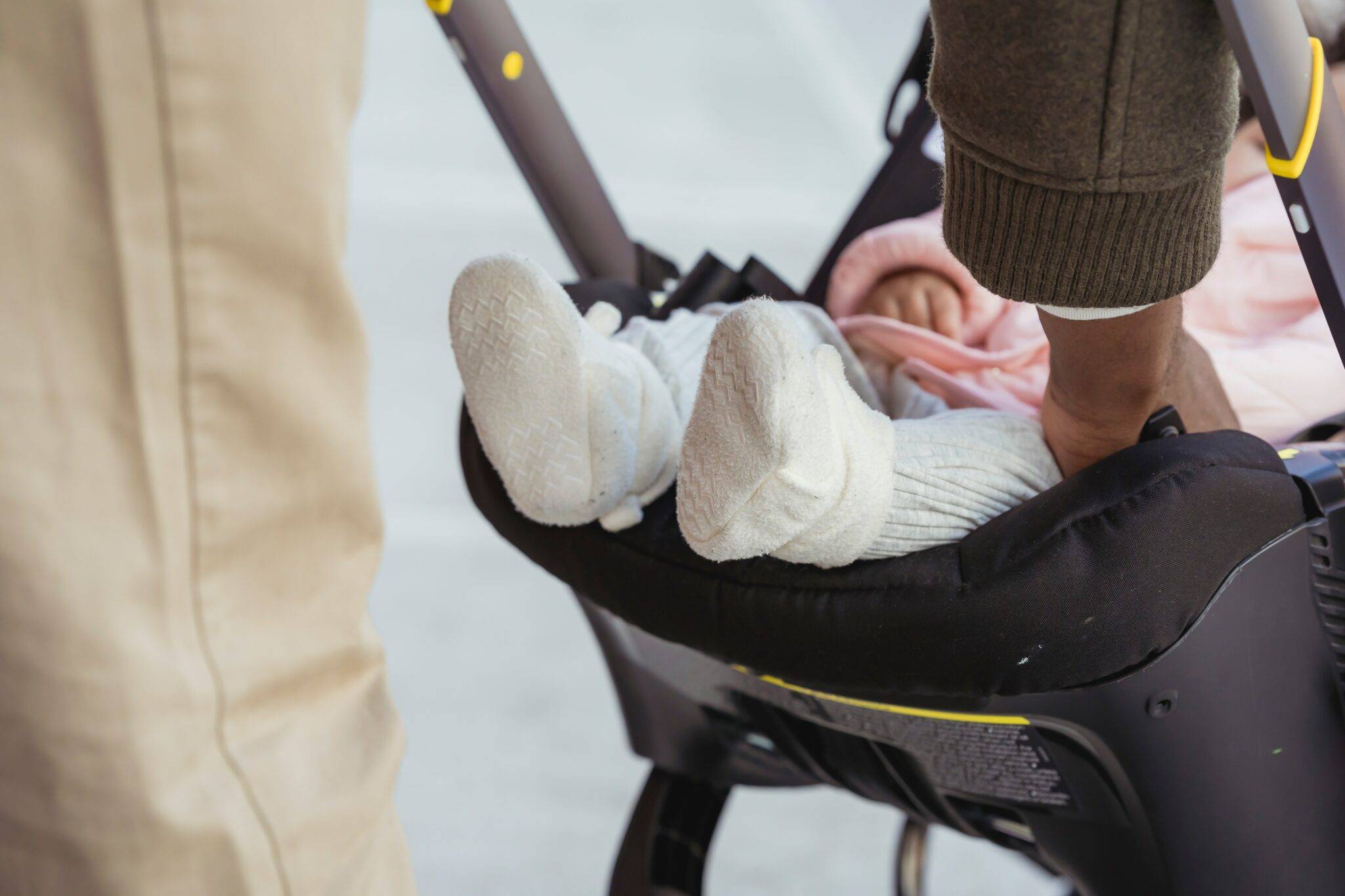As a new mom, have you ever experienced feeling low or a bit frustrated while nursing your baby? In a few instances, your newborn gets fussy and keeps on crying, and you don’t seem to figure out the reason behind it.

Fear not—baby crying is completely normal. To add to that, don’t you know that a typical baby cries for around two to three hours a day in his first six weeks? This is why you have to stretch your patience with your little one!
Why is Baby Crying?
First things first: Why do babies cry anyway? Here’s the scientific explanation:
Baby Crying: The Science Behind It
When your little one attempts to convey a message, baby crying ensues. Remember, though, that babies can’t fully express themselves yet, and crying is their means to get your attention. No worries; baby crying is normal. It’s part of nursing a baby.
Baby crying just means that your newborn wants to tell you something. Crying is your baby’s way of telling you they need comfort and care. Your little bundle of joy might just be hungry, uncomfortable, or in need of your help.
Baby crying could also be a way to block the sounds, sights, and other sensations they feel! Other than that, crying also soothes your baby and helps release some tension.
Now, you might be wondering why your baby crying for no reason, even when he’s not tired, hungry, or uncomfortable. In cases like this, it’s hard to know the real cause.
This is where you, as a parent, come in.
Baby crying happens for different reasons. Over time, you’ll be able to notice your infant’s crying patterns. You may start noticing specific needs that your baby has when crying. You’ll be able to identify if your baby is angry, distressed, or in pain.
You’ll also be able to identify less serious things, such as how your baby doesn’t like his toy or wants to lie on the bed. Observe and experiment with your baby’s needs, and you’ll be able to stop the baby crying!
Don’t worry if it takes too long to stop your baby from crying. After crying, your baby may become more alert and sleep more deeply compared to his normal sleep. This means that your baby sleeps in a more contented state after crying.
Reasons Why Baby Crying Happens
We know how challenging it is to determine why our babies cry, especially if you’re a first-time parent. Look at these common reasons to help you understand your little one’s needs.
- hunger or thirst
- tiredness or sleepiness
- needs to burp
- overstimulation
- wet or dirty diaper
- feeling hot or cold
- boredom
- wind
- wanting a cuddle

Attending to these concerns is enough to calm your baby or stop the baby crying. Unfortunately, it doesn’t work all the time. Sometimes, your baby cries for a long time. If this happens, try experimenting and resolving it for your little one.
You must know that understanding baby crying is a tremendous process that takes time, so be patient and keep your stress levels low!
How to Stop a Baby Crying
Working on your baby’s immediate needs is the easiest way to stop crying. Here are a few things to remember for baby crying issues:
1. Identify your baby’s pressing needs.
First, check if your baby feels hot, cold, tired, hungry, thirsty, or dirty! He might have a wet diaper that only needs replacing or a grumbling tummy. You can also check if there’s something causing discomfort, such as a hair strand tangled around his little toe.
These are the baby’s physical needs that need to be addressed first to address baby crying.
2. Give your baby what it needs.
Once you have identified what your baby needs, resolve it. If your newborn is hungry, try breastfeeding. If your baby is shivering, give your little one a blanket. If your baby feels tired, try transferring him to his crib.
3. Work on baby-soothing techniques.
There are times when your baby wants your attention. In this case, or if you’ve done all those mentioned above and still can’t figure out why he’s crying, you can try soothing techniques that might calm your newborn down.
- Rock gently in a rocking chair or sway with your arms, making them feel secure.
- Gentle strokes and massaging at the head or rhythmic pats at the back or chest
- Safely swaddle them in a receiving blanket to make them feel secure and cozy.
- Sing or talk softly. Calmly and reassuringly can comfort them.
- Play soft music or white noise. This could be music on the radio or a rattle. These background noises can distract the baby and calm them down.
- Walk with him in your arms, in a stroller or carriage.
- Hold the baby close to your body and take calm, slow breaths that will help both of you relax. You can let your baby lie on his belly on your lap.
- Take a ride in a stroller. A gentle stroll calms a crying baby.
- Burp to relieve any trapped gas bubbles.
- Offer a pacifier. Some babies find comfort in sucking a pacifier.
- If you’re breastfeeding, let your baby suckle at your breast.

- Undress your baby and give a gentle and firm massage.
- Give a warm bath. This calms some babies instantly but makes others cry even more.
Again, all babies are different. Your baby might need less stimulation, and others may need more. Combine different techniques and see what works well for your little one.
How to Respond When Your Newborn is Crying from Pain
When your newborn is crying from pain, it can be distressing for both you and your baby. Here’s how to effectively respond:
Recognizing Pain Cries
- Sound: The cries may be more intense, sharp, and grating, differing from typical hunger or discomfort cries.
- Body Language: Babies often arch their backs or thrash around. They might also bring their knees up to their chest or grunt, particularly if gas pain is the culprit.
Calming Techniques
- Sucking Reflex: Using a pacifier or breastfeeding can soothe your baby. The act of sucking engages a natural reflex that helps calm them.
- Pacifiers: These can be particularly effective in helping babies pass gas. Bottle-fed babies might adapt more easily to pacifiers than breastfed babies.
During Painful Procedures
- Anticipation: If you anticipate a painful experience for your baby, such as vaccinations or a heel-prick test, offer a pacifier during the procedure to help alleviate stress and discomfort.
Trust Your Instincts
- When in Doubt: If you suspect that your baby’s cries may be due to something more serious, don’t hesitate to consult your pediatrician. Always trust your parental instincts.
By understanding these signs and responses, you can better comfort your newborn and address their needs effectively.
What to Do When a Baby Doesn’t Stop Crying
There are times of the day when babies tend to cry a lot and can’t be comforted. This commonly occurs during the early evening. This may be hard for parents since it’s often the time when you’re most tired and least able to cope.
Baby crying tends to peak when they’re around four to eight weeks old and gradually decreases. You might ask, ‘What if I’ve done everything and still can’t let my baby stop crying? If this is the case, these might work for you.
- Leave your baby alone.
If you’re just at home or in a safe place, you can try leaving your baby alone. The best place to leave your baby alone is in his crib, or where he sleeps. This is because your baby might doze off when left alone to cry.
But if your baby still doesn’t stop crying (from day to night!), your baby might have an unfatal condition called colic. Your baby might have colic if he cries more than three hours a day! This is highly common among newborns.
On a happy note, colic is often outgrown when your baby grows! However, you can consult with a pediatrician like Omega Pediatrics if this concerns you or your baby crying seems excessive.
- Contact your pediatrician.
Your baby might be sick. Check his temperature. If his temperature is 00.4 degrees Fahrenheit (38 degrees Celsius) or higher, your baby has a fever or is developing an infection. See your pediatrician immediately.
If this happens, keep calm and relax. It’s always easier to think thoroughly if you’re calm. Omega Pediatrics is open until nine o’clock in the evening to attend to your baby’s concerns. If you are near Atlanta, Georgia, we would gladly assist you and your baby.
Things to Remember when Soothing a Crying Baby
We know that babysitting is a tough job, especially when your bundle of joy begins to cry! But don’t be overwhelmed when this happens. More importantly, don’t stress yourself! Keep in mind these important things when soothing to stop a baby crying.
Take a Break
If you think you can’t manage your baby’s crying after trying many techniques to get your little one to stop, take a break. Don’t overdo it.
If you’re feeling impatient, angry, bothered, or frustrated since you can’t stop your baby from crying, steering away is the next best thing to do. Never hit your little one as well.
Never Shake Your Baby
One golden reminder is to never shake your baby to stop him from crying. Shaking moves the head violently, which could have an irreversible impact, causing blindness, permanent brain damage, or even death.
This is called Shaken Baby Syndrome, also known as abusive head trauma. This usually occurs when a person shakes a baby out of frustration when the baby doesn’t stop crying.
Consider sharing this very important information with your family and friends so they will not accidentally shake your baby or their baby, too.
Ask Outside Help
Instead, try to take a deep breath and let someone you trust handle your baby. You may seek help from a close friend or a family member. Sometimes, a new face is all your baby needs to stop his tantrums.
There may be times when you’re so tired and angry that you feel like you can’t take it anymore. This happens to a lot of parents, so don’t be ashamed to ask for help.
Everything will Get Better, and Your Baby will Stop Crying
We understand where you’re coming from. And we know the struggles of soothing a crying baby. Know that crying is normal, especially among newborns. When your baby cries, it doesn’t mean you’re a bad parent! It just means that they need something.
While a crying baby could be challenging and stressful for parents, don’t lose hope, and everything will get better. Sooner or later, your little bundle of joy will stop crying. We, as parents, just have to be more understanding and patient in handling the situation.
Also, many other parents are also experiencing the same situation as yours—you’re not alone! Every baby is different, and with time, you’ll be able to understand their crying patterns. All you have to do is be calm and understand your baby’s needs.
Things will get better in time because this crying phase is just temporary! If you need a helping hand, Omega Pediatrics is here to help.






